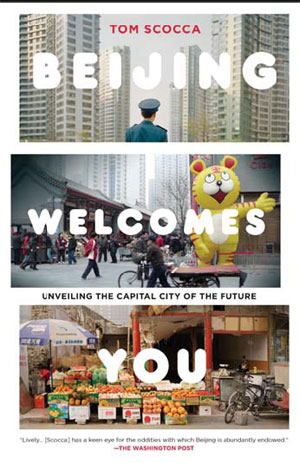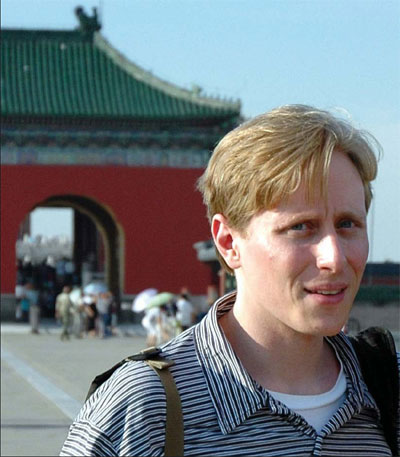The games of change
Updated: 2012-07-27 07:34
By Kelly Chung Dawson (China Daily)
|
||||||||
|
Tom Scocca, who was in Beijing in a time of great change. Philipp Pan / For China Daily |
Author's experience in China at time of Olympics
In the years before the 2008 Beijing Olympics, the city was in frantic disarray, preparing to present an idealized version of home - as any host might before a grand celebration. But the tension between what was intended as performance for a global audience versus the reality of what it meant to be a resident of Beijing at the time could be particularly revealing, says Tom Scocca, author of Beijing Welcomes You.
"Part of what defined this period in China's existence was that there was this process of intentional engagement with the rest of the world," Scocca says. "What was so noteworthy about that period ... was this attempt to create a fully contained narrative preview of what China wanted the 21st century to look like."
Scocca, managing editor of the sports website Deadspin, moved to Beijing with his Chinese American wife in 2004. Before the end of their sojourn, they had welcomed a son and seen the successful completion of one of the country's most triumphant public spectacles. The experience of navigating a quickly changing city in the midst of a period of great upheaval both in his own life and in that of the nation made it difficult to write as an unbiased observer, he says.

"Being a foreign observer of a spectacle that was to a great extent specifically designed to be observed by foreigners made it impossible to be objective. My being there amplified the classic anthropological problem that any observer inevitably has influence on a scene. But I tried to give an honest accounting of what I was seeing and experiencing, and all that was happening around me."
Indeed, Scocca faithfully recounts an impressive array of details from a wholly American perspective, capturing a period defined by a nation focused on the future.
"When the work was done - if the work got done - a once backward and closed-off capital would open up into a national and international showpiece, a city of ample green space and avant-garde architecture, with smooth-flowing transit and traffic, a place that would be civilized and tidy and multilingual," he writes. "The soot and dust I was breathing were the entropy from which a new creation would arise. New York? New York would be there in 2009 or 2010, mostly the same. I would have only one chance to see Beijing before it became something else."
He describes his exploration of Beijing's traditional hutong and brand new construction sites, watches as familiar landmarks are rapidly replaced, attempts to understand the country's weather control systems, and recalls the often maddening hilarity of expat life in a truly unfamiliar culture.
"Everywhere on the street, if you looked, there was something odd about the details," he writes. "A wood-paneled trolley went by, its overhead brushes reaching into empty air, where electrical wires would have been. The shop signs were rendered in elaborate pre-revolutionary characters, but they read from left to right, in the modern manner ... It was as fake as could be, this China. Incoherent, ahistoric, self-contradictory, all-devouring. But if you walked 20 yards away from this glib prosperity you could stand in the rubble, graffiti, and squalor, the Beijing of ruins and unfinished works. Ten yards back, and there was a crowd of people getting along with their ordinary business, buying and selling.
"These three Beijings - the moneyed artificial one, the wretched and broken one, the live and bustling one - stretched on in parallel, just out of sight of one another. You could stand in each one, any one, and believe you were seeing the true thing."
As a journalist, Scocca was in a particular position to observe what China hoped to present to foreign observers. He found the experience of dealing with meida officials frustrating and the process of gathering information difficult, he says. "Even in cases where they were trying to give you information, it could be extremely ineffective," he says. "I don't necessarily mean in the sense of ferreting out some deep secret, but it was difficult to ask follow-up questions, and people weren't used to explaining things."
The process of reporting on a city that was changing even as he wrote was challenging: "Getting to know Beijing was like doing archaeology with someone shoveling dirt and rubbish down into the pit on top of you," he writes.
The title of the book, Beijing Welcomes You, is also the name of a song that weaves its way through Scocca's account of his stay, an uplifting anthem that was everywhere in the build-up to the Games. Ultimately he came to view the song as ironic, as he found the city both welcoming and suspicious of foreign influences.
"There's certainly an irony built into the title," he says. "It can be read in different ways. There's always been that tension between China's desire to be part of the international community, and the country's desire for stability and control."
Recent reports of anti-foreigner sentiment in the capital are disheartening, he says.
He is eager to return to China, but also wary of the pollution that exacerbated his son's asthma and has had what he believes to be long-term effects on his own lung capacity, he says.
"But I'm very glad I was there to have seen it, and I don't wish to have missed that time in Chinese history."
Above all he saw evidence of an enormous optimism during his stay, he says.
"There is a sincere effort to engage with the rest of the world, and an atmosphere of possibility that allows for a genuine belief that it's possible for life to get better."
"The scale in China is something that you can know in the abstract, but seeing it in person makes it real in a way that the numbers really can't. Your expectations are constantly getting overturned in a way that is funny. I do hope that I can do that for people, to convey some sense of how vast the Chinese undertaking is."
Contact the writer at kdawson@chinadailyusa.com

 Relief reaches isolated village
Relief reaches isolated village
 Rainfall poses new threats to quake-hit region
Rainfall poses new threats to quake-hit region
 Funerals begin for Boston bombing victims
Funerals begin for Boston bombing victims
 Quake takeaway from China's Air Force
Quake takeaway from China's Air Force
 Obama celebrates young inventors at science fair
Obama celebrates young inventors at science fair
 Earth Day marked around the world
Earth Day marked around the world
 Volunteer team helping students find sense of normalcy
Volunteer team helping students find sense of normalcy
 Ethnic groups quick to join rescue efforts
Ethnic groups quick to join rescue efforts
Most Viewed
Editor's Picks

|

|

|

|

|

|
Today's Top News
Chinese fleet drives out Japan's boats from Diaoyu
Health new priority for quake zone
Inspired by Guan, more Chinese pick up golf
Russia criticizes US reports on human rights
China, ROK criticize visits to shrine
Sino-US shared interests emphasized
China 'aims to share its dream with world'
Chinese president appoints 5 new ambassadors
US Weekly

|

|








